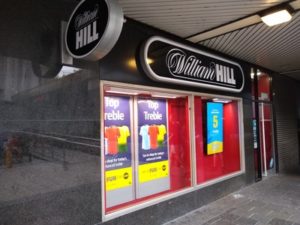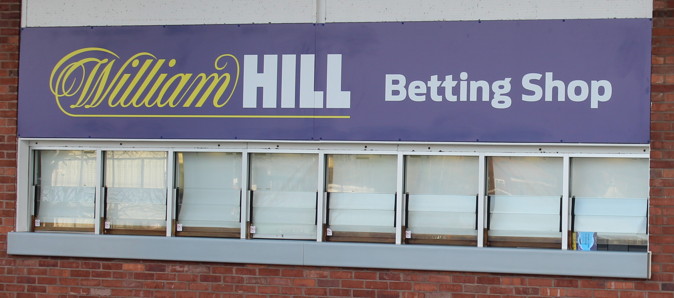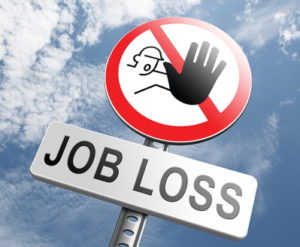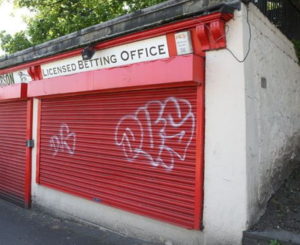William Hill Closing 119 Betting Shops, What Is The Future For UK Bookies?
 William Hill, one of the largest betting companies in the world, has confirmed that 119 of its shops will not reopen after the current world situation returns to normal. The company was already feeling the pinch in the wake of the maximum stake being introduced to Fixed Odds Betting Terminals, but the drop in customers owing to the recent health crisis has seen a further need for cutbacks, with the bookmaker not expecting customer numbers to return to their previous levels any time soon.
William Hill, one of the largest betting companies in the world, has confirmed that 119 of its shops will not reopen after the current world situation returns to normal. The company was already feeling the pinch in the wake of the maximum stake being introduced to Fixed Odds Betting Terminals, but the drop in customers owing to the recent health crisis has seen a further need for cutbacks, with the bookmaker not expecting customer numbers to return to their previous levels any time soon.
There are around 1,500 William Hill stores around the United Kingdom and trading has generally recovered in the wake of the country’s lockdown, but the need to shut the stores permanently remained. As a result, about 300 members of staff will be affected, though William Hill are trying to redeploy as many of them as possible. Interestingly, the company’s decision comes in the wake of pre-tax profits of £141 million for the opening six months of the year.
Why The Shops Are Being Closed

Given that William Hill reported pre-tax profits of £141 million for the first six months of 2020, which compares favourably to the £63 million loss that was reported in the same period last year, many people might wonder why there is a need to close stores at all. In actuality, though, the company’s revenues have fallen by around a third, sitting at £554 million. This is mostly due to the effects of the lockdown and the fact that huge numbers of sporting events were cancelled.
William Hill themselves have said that it’s the fact that retail footfall is likely to remain low for the foreseeable future that has caused them to close the shops.
“We anticipate that longer term retail footfall will not return to pre-COVID levels and 119 [UK] shops will remain closed following early lease breaks, with the majority of colleagues redeployed within the estate.”
It’s interesting that the shops that have shut are ones that had breaks in their leases rather than were unprofitable.
William Hill Has Recovered Well
 Generally speaking, William Hill has handled the health crisis, which is affecting the United Kingdom and the rest of the world, quite well. Trading was ‘strong’ at the start of the year and costs have been controlled ‘effectively’ since sporting events ground to a halt in most places. It is recovering well now that sports have resumed, though that has not been the case when it comes to its physical shops. That being said, they’ve been in decline for some time.
Generally speaking, William Hill has handled the health crisis, which is affecting the United Kingdom and the rest of the world, quite well. Trading was ‘strong’ at the start of the year and costs have been controlled ‘effectively’ since sporting events ground to a halt in most places. It is recovering well now that sports have resumed, though that has not been the case when it comes to its physical shops. That being said, they’ve been in decline for some time.
The reduction in the maximum stake that could be played on Fixed Odds Betting Terminals from £100 to £2 caused major issues for companies with a strong high street presence. William Hill closed around 700 shops when the new regulation was introduced, which is indicative of how important FOBTs have been to their profits over the years. It was mainly the use of online gaming that saw William Hill able to cope with the lack of sport for most of this year.
Continued Development Needed
 According to Julie Palmer, who is a partner at Gegbies Traynor, William Hill will need to keep developing in order to regain at least some of the revenue that has been lost this year. They are operating in a ‘competitive market’ and therefore the business will ‘need to continue developing its technology platform’ as well as improving the various products on offer in order to get back into the black in the long-term. That will also take advantage of a ‘spike in bored consumers’.
According to Julie Palmer, who is a partner at Gegbies Traynor, William Hill will need to keep developing in order to regain at least some of the revenue that has been lost this year. They are operating in a ‘competitive market’ and therefore the business will ‘need to continue developing its technology platform’ as well as improving the various products on offer in order to get back into the black in the long-term. That will also take advantage of a ‘spike in bored consumers’.
With William Hill looking to expand into the United States of America and the newly opened up market there, an improved online offering can only help. The company’s international business has grown by 17% in recent times, including around a third of all sports bets placed in the US being with William Hill or associated brands. The experience gained from the increased traffic during the past few months has set the company up well moving forward.
CEO ‘Delighted’ With Performance
 The Chief Executive Officer of William Hill, Ulrik Bengtsson, has declared himself to be ‘delighted’ with the company’s performance during what he referred to as ‘extraordinary times’. He said, “Our team has been remarkable, supporting each other and our customers throughout the pandemic”, going on to thanks those that work for the company for what they’ve done and their ‘continuing efforts’.
The Chief Executive Officer of William Hill, Ulrik Bengtsson, has declared himself to be ‘delighted’ with the company’s performance during what he referred to as ‘extraordinary times’. He said, “Our team has been remarkable, supporting each other and our customers throughout the pandemic”, going on to thanks those that work for the company for what they’ve done and their ‘continuing efforts’.
Bengtsson also pointed to the government’s furlough scheme as something that was much-needed at the time it was introduced. He said, “The furlough scheme provided welcome and timely support, and meant we could protect the jobs of our 7,000 UK retail colleagues. Therefore, given the strength of our recovery post-lockdown, we have decided to repay the furlough funds.” At the time of writing, around £24.5 million is being paid back to the government by William Hill.
Few Redundancies Expected
 The good news for William Hill’s employees is that very few of them are expected to lose their jobs. The company’s sprawling and expanding nature means that it has the ability to shift shop workers to other parts of the business, including different stores located close to the ones that are closing. Indeed, only sixteen redundancies are expected to be necessary as a result of the 119 store closures, with everyone else being redeployed.
The good news for William Hill’s employees is that very few of them are expected to lose their jobs. The company’s sprawling and expanding nature means that it has the ability to shift shop workers to other parts of the business, including different stores located close to the ones that are closing. Indeed, only sixteen redundancies are expected to be necessary as a result of the 119 store closures, with everyone else being redeployed.
Having furloughed about 7,000 members of staff during the lockdown, William Hill will be pleased that they’re able to not only hang on to most people but also repay the wages that the government took on the responsibility for. The company will also be keen to point to the positive story after seeing its revenue drop by around 50% at the start of the crisis. The return of football was an important step on the road to financial recovery, given that it is the most bet on sport in the world.
William Hill is at least partly praising the new-look corporate structure for its ability to cope over the past couple of months. A transformation programme was introduced about a year ago and it is felt by those in the know that it aided dealings with the complexities of the current situation. It was also the case that the online activity of the company, which provides about 67% of income, was able to withstand the crisis and has helped to reduce the need for job losses.
How Times Have Changed
 A few decades ago William Hill would never dream of closing shops, indeed they were one of the first bookies to open shops when off-track gambling was legalised in the 1960’s and then spent a huge amount of time and money building them up and at one stage owned over 2300 premises in the UK.
A few decades ago William Hill would never dream of closing shops, indeed they were one of the first bookies to open shops when off-track gambling was legalised in the 1960’s and then spent a huge amount of time and money building them up and at one stage owned over 2300 premises in the UK.
In the pre-digital age owning the most shops made you the biggest brand but that has now all changed as online gambling revenues continue to rise and land-based profits fall in tandem. These days holding hundreds or thousands of shops that earn you less money each year does not make business sense and so companies have been looking to offload their less profitable shops for years.
The FOBT ban followed a year later by the lockdown caused by corona virus was a double hammer blow for an already struggling retail betting sector. This is likely to be the first of many announcements over the coming months and years that will likely see the number of betting shops in the UK halve at least from the current level of around 9000.
Many will point the finger at the bigger bookies for not protecting jobs and livelihoods by closing shops while they still make record profits. For them though it does not make business sense to run costly shops when they can make so much more online and in new markets, such as the USA.
The fact remains most jobs that are lost will be lower skilled local jobs and the jobs created will be more technical jobs in city hub locations. This has an overall effect of weighting the majority of the negative aspects onto poorer and struggling communities.
Benefits Of Shops Closing?
 There are benefits to shops closing for many too. For years people have felt bookie shops are a blight on communities dominating many high streets and they will be glad to see the numbers fall. On the flip side given retail is struggling in all sectors though it is hard to see what will replace them. People say high streets are just bookies, coffee vendors and charity shops; now it looks like it could become just coffee and charity shops.
There are benefits to shops closing for many too. For years people have felt bookie shops are a blight on communities dominating many high streets and they will be glad to see the numbers fall. On the flip side given retail is struggling in all sectors though it is hard to see what will replace them. People say high streets are just bookies, coffee vendors and charity shops; now it looks like it could become just coffee and charity shops.
There may be token benefits as it may help some problem gamblers who use shops, overall though this will pale in insignificance compared to the rising problem online.
Not all shops will close, the most profitable ones will remain open and there will be bookies shops around for many decades to come. These will naturally be located in high foot flow areas, such as city centres, although it looks like the days are now numbered for most suburban and rural shops.
Perhaps in 100 years time a William Hill shop will be preserved as museum attraction and people will say “people used to go to a shop to gamble, how bizarre”.



